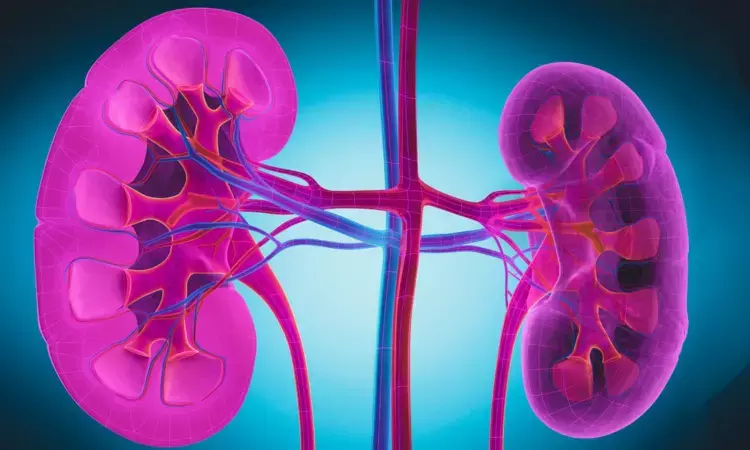- Home
- Medical news & Guidelines
- Anesthesiology
- Cardiology and CTVS
- Critical Care
- Dentistry
- Dermatology
- Diabetes and Endocrinology
- ENT
- Gastroenterology
- Medicine
- Nephrology
- Neurology
- Obstretics-Gynaecology
- Oncology
- Ophthalmology
- Orthopaedics
- Pediatrics-Neonatology
- Psychiatry
- Pulmonology
- Radiology
- Surgery
- Urology
- Laboratory Medicine
- Diet
- Nursing
- Paramedical
- Physiotherapy
- Health news
- Fact Check
- Bone Health Fact Check
- Brain Health Fact Check
- Cancer Related Fact Check
- Child Care Fact Check
- Dental and oral health fact check
- Diabetes and metabolic health fact check
- Diet and Nutrition Fact Check
- Eye and ENT Care Fact Check
- Fitness fact check
- Gut health fact check
- Heart health fact check
- Kidney health fact check
- Medical education fact check
- Men's health fact check
- Respiratory fact check
- Skin and hair care fact check
- Vaccine and Immunization fact check
- Women's health fact check
- AYUSH
- State News
- Andaman and Nicobar Islands
- Andhra Pradesh
- Arunachal Pradesh
- Assam
- Bihar
- Chandigarh
- Chattisgarh
- Dadra and Nagar Haveli
- Daman and Diu
- Delhi
- Goa
- Gujarat
- Haryana
- Himachal Pradesh
- Jammu & Kashmir
- Jharkhand
- Karnataka
- Kerala
- Ladakh
- Lakshadweep
- Madhya Pradesh
- Maharashtra
- Manipur
- Meghalaya
- Mizoram
- Nagaland
- Odisha
- Puducherry
- Punjab
- Rajasthan
- Sikkim
- Tamil Nadu
- Telangana
- Tripura
- Uttar Pradesh
- Uttrakhand
- West Bengal
- Medical Education
- Industry
Long-term voclosporin use benefits patients with lupus nephritis: Renal Biopsy Data from AURORA trial

Canada: A data analysis obtained from follow-up kidney biopsies of AURORA 2 participants have shed further light on the long-term effects of voclosporin (Lupkynis) on renal function in patients with lupus nephritis (LN).
Aurinia Pharmaceuticals Inc announced promising results from the AURORA Renal Biopsy Sub-Study. LUPKYNIS is a novel agent approved for treating adults with active lupus nephritis.
The study results were presented at the Congress of Clinical Rheumatology (CCR) East 2023 annual meeting. The study included biopsy data from 16 patients in the voclosporin arm and 10 from the placebo arm.
The study indicates that the use of the agent was associated with decreased disease activity scores and a higher rate of patients achieving either complete or partial resolution, with efficacy results non this subgroup consistent with the overall study population.
The addition of LUPKYNIS on top of the then-current standard of care MMF and low-dose steroids in Aurinia’s Phase 3 AURORA 1 and AURORA 2 studies led to significantly earlier and greater reductions in proteinuria while maintaining stable renal function, as evidenced by a stable estimated glomerular filtration rate (eGFR) slope over time. To further characterize the long-term impact of LUPKYNIS on the kidney at the histologic level, repeat biopsies were collected from selected patients in both treatment arms (the active control arm with patients treated with only MMF and steroids, and the study arm of voclosporin in combination with MMF and steroids). The patients in the voclosporin treatment arm demonstrated histologic activity improvement with stable chronicity scores similar to the active control arm of MMF and low-dose steroids alone over the 18-month average treatment period at the time of repeat biopsy.
"We are encouraged by these results," said Dr. Greg Keenan, recently appointed Chief Medical Officer of Aurinia. "Seeing similar improvement in the activity scores and absence of change in the chronicity scores with the LUPKYNIS treated patients as compared to those on MMF and low dose steroids alone strengthens the totality of the evidence supporting the long-term efficacy and safety of LUPKYNIS and further differentiates the safety of this second-generation treatment from the legacy, first generation CNIs."
Repeat renal biopsies were obtained from 16 patients in the voclosporin arm and 10 patients in the active control arm over 18 months from study entry. Baseline and follow-up activity scores, a measure of active inflammation in LN, and chronicity scores, a measure of irreversible kidney injury, were obtained using a validated assessment tool. Compared to baseline, the activity scores for both LUPKYNIS and active control populations improved similarly, while the chronicity scores remained stable over time in both arms.
Dr. Brad Rovin, Professor of Nephrology and Director, the Division of Nephrology at the Ohio State University Wexner Medical Center said, "The lack of histologic evidence of CNI nephrotoxicity and the absence of progression of chronic kidney damage after approximately 18 months of treatment further strengthen the overall evidence supporting the long-term safety of LUPKYNIS in LN patients."
Dr Kamal Kant Kohli-MBBS, DTCD- a chest specialist with more than 30 years of practice and a flair for writing clinical articles, Dr Kamal Kant Kohli joined Medical Dialogues as a Chief Editor of Medical News. Besides writing articles, as an editor, he proofreads and verifies all the medical content published on Medical Dialogues including those coming from journals, studies,medical conferences,guidelines etc. Email: drkohli@medicaldialogues.in. Contact no. 011-43720751


